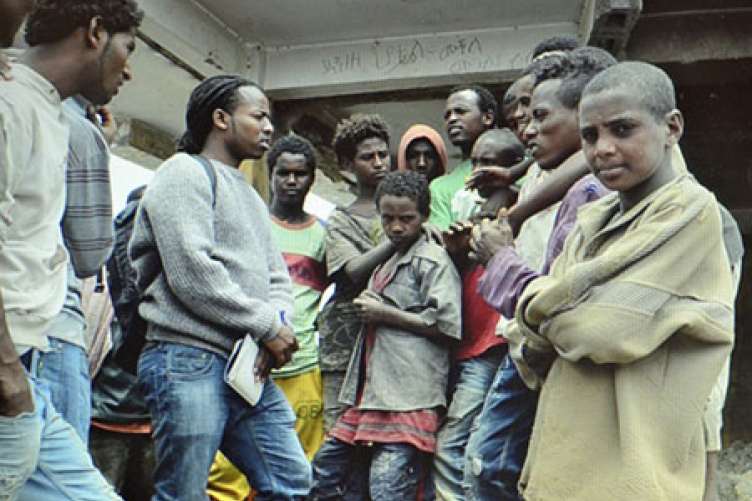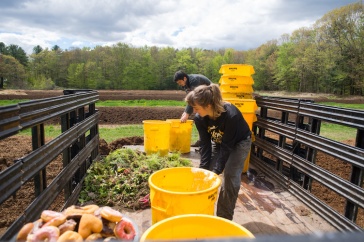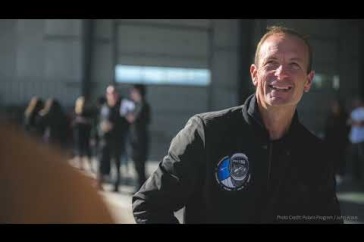
Student Documents Poverty in the Place of His Birth
Merhawi Wells-Bogue '13 (gray sweater) interviewing some street children in Mekelle, Ethiopia
Since traveling to Ethiopia this past summer, Merhawi Wells-Bogue ’13 has been making a documentary film about the lives of homeless children in the northern Ethiopian city of Mekelle.
Though his goal is journalistic — to raise awareness of street kids — his connection to his subject is deeply personal. A decade ago, when he wasn’t yet a teenager, Wells-Bogue worked as a street vendor in Mekelle, trying to support himself and his siblings after they had lost contact with their mother. “I have learned what it feels to be a street child,” says Wells-Bogue, who studies journalism at UNH. “I know their pain. I know what they’re going through.”
This empathy helped him relate to the marginalized children he met in Mekelle, where he spent nine weeks with support from the Hamel Center’s Summer Undergraduate Research Fellowship (SURF) Abroad program. Many of the homeless kids he interviewed came from impoverished or abusive families. Some had been orphaned by HIV/AIDS, whose prevalence is much higher in Ethiopia than in the United States.
No matter what their backgrounds, though, Wells-Bogue encouraged them to tell their stories. “As a college student, I can hand a microphone to the children so they can speak and their voices can be heard. Because that’s what I missed as a kid. I didn’t have someone who could give me a microphone so I could speak about my situation. I was on my own.”
Wells-Bogue grew up in Mekelle. His father, a soldier, left the family when Wells-Bogue was a baby. His mother, who was illiterate, worked in an incense factory and washed clothes for wealthy households. Though she worked hard, she couldn’t earn enough by herself to support the family. When Wells-Bogue was seven, she returned to neighboring Eritrea, where she’d lived previously, in search of a better job. She found one and sent money every month to her children, who had stayed behind in Mekelle. In 1998, however, war broke out between Ethiopia and Eritrea. Abruptly Wells-Bogue and his three older sisters stopped hearing from their mother.
“That’s when our lives turned upside down,” Wells-Bogue recalls. “As kids, we felt powerless because we didn’t have anyone to help us and understand us.”
They struggled to survive. Wells-Bogue started working as a street vendor, selling items such as boiled eggs, pocket tissues, cigarettes, condoms, gum, lollipops and chocolate. He lived with two of his sisters in a small rented room furnished with a single bed. “We were going to school, but it was difficult,” he says. “There were days when we used to go to school on an empty stomach.”
Though he wanted to be in school, Wells-Bogue did poorly academically. Because he worked through the night, he sometimes fell asleep in class. His mind was on how to make money rather than on his coursework.
Eventually, a government worker helped him and his sisters enter an orphanage, though Wells-Bogue continued to work as a street vendor to earn money for clothes and shoes. After a couple of years, his sisters were transferred to an orphanage run by an American woman. About a year later, Wells-Bogue joined his sisters, and the director arranged for the three siblings to be adopted by an American family. At age 14, Wells-Bogue moved to Grantham, New Hampshire, where he attended Lebanon High School and later followed two older siblings to UNH.
But he and his sisters still didn’t know what had happened to their mother. It wasn’t until they’d lived in the United States for six years that they received astonishing news from their oldest sister, who was still in Ethiopia with her family: Their mother had made it back to Mekelle. In 2011, Wells-Bogue and his sisters in New Hampshire traveled to Ethiopia to see their mother for the first time in nearly 15 years. “I had a missing piece in me and that missing piece was the uncertainty about my mom — whether she was alive or dead. That missing piece was filled when I saw my mom. That really completed me as a person and I thank God for it.”
Yet memories of the hunger and loneliness he and his sisters experienced years earlier were with him as he worked on the documentary. At times, the project became emotionally exhausting, Wells-Bogue says, and he wondered if he should continue. “I found it difficult to detach myself because I could understand the children and feel what they were feeling,” he says. “It was affecting me when they told me their stories.”
He was especially moved by the stories of underage prostitutes. These girls are exposed to alcohol, drugs, and HIV/AIDS, and often suffer physical and emotional abuse. They stay in their rooms all day rather than risk public shame. “They feel like they’re going to be judged and insulted, and they’re afraid. This puts them in a very isolating position.”
Another time, Wells-Bogue encountered six kids playing on the street at 2 a.m. He interviewed a 13-year-old who said he’d run away after his stepmother pushed him into the fire, burning his back. The boy was certain he would never return home.
“I listened to his story, and then I said, ‘What do you want to say to the prime minister of Ethiopia? What would you say to him?’ He said he would ask the prime minister to help him and send him to school.”
Editor’s note: To view photos and video from Wells-Bogue’s trip, visit his blog at http://liftstreetkids.com/
Originally published by:
UNH Today
Written by Sonia Scherr ’13MFA. Photos courtesy Merhawi Wells-Bogue '13.
















































